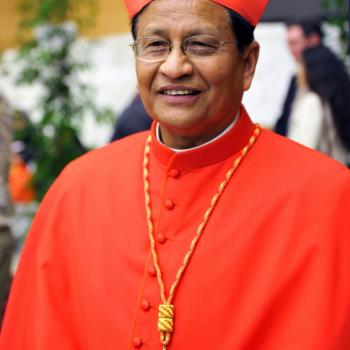Much is being made of a story in The Tablet regarding the Orthodox Church and Russia. The story reflects a typical British bias, loathing of State religion. Given our own history, we tend to share suspicion of religion playing any role other than a private association. This country has flourished absent the Church being a foundational institution. There are no stories of any U.S. President approaching a bishop barefoot in the snow begging forgiveness for some evil he has done.
Commenting about Russia is difficult because its history is so different than our own. In some respects the Rus expanding its borders to Asia is more akin to the Spanish colonialism in South America than it is to the United States conquering its western frontier. Russia is a bit of a contradiction in that her history has largely been composed of a strong central leader over equally strong cultures. For instance, parts of Russia have a very strong Muslim culture where Orthodoxy isn’t present, yet Russia is very much an Orthodox country. It is cosmopolitan in the sense of having a mix of cultures with different languages and even leadership traditions, but it is very homogenous with just a little variation in cities like Moscow and St. Petersburg.
The Declaration on Human Rights and Dignity promulgated by the Orthodox Church and the ideas within it is specific target of criticism. For background, the UN’s Declaration on Human Rights is here. It is a fairly short read. I will highlight a few of the important points.
The eternal moral law has a solid foundation in the human soul,
independent of one’s culture, ethnic origin or life circumstances. This
foundation is laid down by the Creator in human nature and manifested in
human conscience. This could have very easily been stated by Vatican II. The concept of a moral law established by God is completely absent the CHR.
Human rights are based on the worth of the person and should have as their
goal the realization of the person’s human dignity. Therefore, human
rights essentially involve morality. Any separation of these rights from
morality means their profanation, for there is no such thing as immoral
dignity. The foundation established in this paragraph is an important one. In the West and particularly in this country, we struggle to find a way to condemn such things as pornography. Well, we don’t struggle so much; we have pretty much capitulated to allowing this immorality. The CFR is quite ambigious on the matter of morality, and it could be interpreted as requiring rights for homosexuals to wed and other perversions.
It is unacceptable, in pursuit of human rights,
to oppress faith and moral tradition, insult religious and national
feelings, cause harm to revered holy objects and sites, jeopardize the
motherland. Likewise we see as dangerous the “invention” of such “rights”
as to legitimize a behavior condemned by both the traditional morality and
historical religions. I couldn’t have said it better myself.
We seek dialog with people of diverse faiths and views on human rights and
their place in the hierarchy of values. Like nothing else, this dialogue
today will help avoid the conflict of civilizations and attain a peaceful
diversity of worldviews, cultures, legal and political systems on the
globe. The future of people depends on their success in this endeavor. There are echoes of Pope Benedict’s Regensberg address here.












